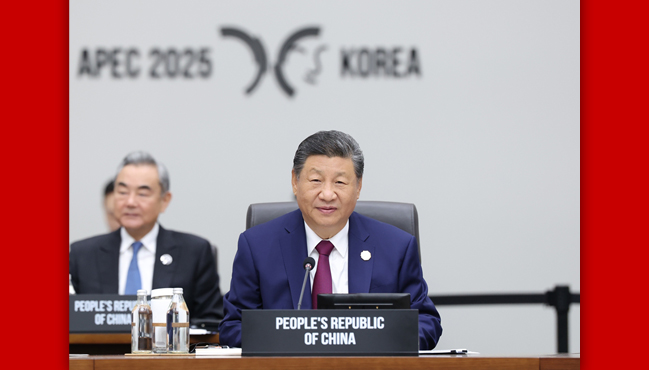
站内搜索
|
Since the Sixteenth CPC National Congress, the Party Central Committee, with Hu Jintao as General Secretary, has attached great importance to and strengthened its work on Taiwan in terms of the situation as a whole and in terms of strategy; conducted a thorough review of its practical experiences in work related to Taiwan; incisively grasped the complex changes that have taken place in the Taiwan Straits situation; conducted an objective, comprehensive and dialectical analysis of the overall situation relating to the Taiwan question; accurately come to terms with the rules governing the development of cross-Straits relations; inherited, enriched and developed the major policies and guiding principles of the third generation of central Party leadership concerning work on Taiwan; introduced a series of new ideas on developing cross-Straits relations and achieving peaceful reunification; and made a series of major decisions and arrangements to oppose Taiwan independence and promote the peaceful development of cross-Straits relations. 1. Taking Opposing and Containing Taiwan Independence as the Primary Task in Work Related to Taiwan under the New Circumstances After the Sixteenth National Congress, the Party Central Committee watched closely the constantly escalating secessionist activities aimed at Taiwan independence of Chen Shui-bian. In response to greater risk-taking by the Taiwan authorities and Taiwan independence secessionist forces, a significant increase in the likelihood of a major incident involving the Taiwan independence movement and the increasingly dangerous situation which threatened China’s sovereignty and territorial integrity after Chen Shui-bian was reelected in March 2004, the Central Committee made the major policy decision to counter Taiwan independence. The Central Committee stated that achieving the complete reunification of the motherland was its firm goal, and based on the reality of the situation in the Taiwan Strait it must make opposing and containing Taiwan independence the primary task of its work related to Taiwan under the new circumstances, with a focus on stopping secessionist forces from seeking de jure Taiwan independence by promoting constitutional reform or holding a referendum. The Central Committee stated that in order to create the conditions for the early resolution of the Taiwan question and achieve the complete reunification of the motherland, it is necessary to adhere to major policies on Taiwan, integrate and utilize all forces, resolutely thwart attempts by secessionist forces to achieve Taiwan independence, defend China’s sovereignty and territorial integrity, and maintain basic stability in cross-Straits relations as well as a period of important strategic opportunities. This basic line of thought arrived at by the Central Committee has been highly significant in mobilizing the entire Party to further strengthen its work related to Taiwan, opposing secessionist activities aimed at Taiwan independence and moving forward the reunification process. 2. Raising Four Opinions on Developing Cross-Straits Relations under the New Circumstances On March 4, 2005, Hu Jintao gave a speech on the Taiwan question and work related to Taiwan in which he emphasized that China will never vacillate from the one-China principle, never abandon efforts to achieve peaceful reunification, never change its policy of placing its hopes on the Taiwan people and never compromise in its opposition to secessionist activities aimed at Taiwan independence. These four opinions have enriched the guiding principles for work related to Taiwan and provided a strategic basis for such work, and they are important guidelines that must be followed in all work related to Taiwan under the new circumstances. 3. Formulating the Anti-Secession Law Formulating the Anti-Secession Law was a major policy decision made by the Central Committee after appraising the situation at the time. In March 2005, the Anti-Secession Law was passed at the Third Session of the Tenth National People’s Congress, which enacted the Central Committee’s major principles regarding the Taiwan question into law, and fully reflects its consistent position of striving with the utmost sincerity to achieve peaceful reunification. At the same time, it demonstrates the common will and firm determination of the entire Chinese people to safeguard national sovereignty and territorial integrity and to never allow secessionist forces who seek Taiwan independence to split Taiwan from China under any name or by any means. This law therefore plays an important practical role and is of profound historical significance. 4. Proposing the Theme of Peaceful Development in Cross-Straits Relations When General Secretary Hu Jintao held formal talks in April and May 2005 with Chairman of the Kuomintang Lien Chan and Chairman of the People First Party Sung Ch’u-yu respectively, he proposed the idea of building peaceful and stable cross-Straits relations. In April 2006, General Secretary Hu Jintao also proposed that “peaceful development ought to become the theme of cross-Straits relations and the objective that compatriots on both sides of the Strait struggle for together.” He stated that upholding the 1992 Consensus is an important foundation for achieving the peaceful development of cross-Straits relations, working for the wellbeing of compatriots on both sides of the Straits is the basic end result of achieving the peaceful development of cross-Straits relations, deepening mutually beneficial exchanges and cooperation is an effective means of achieving peaceful development of cross-Straits relations, and carrying out talks on the basis of equality is the only way to achieve the peaceful development of cross-Straits relations. These ideas and remarks reveal the Party’s sincerity regarding maintaining peace in the Taiwan Straits; reflect a correct understanding of the common aspirations of compatriots on both sides of the Straits, the development trends in cross-Straits relations as well as peace and development trends in today’s world; indicate the direction cross-Straits relations are heading; and have had a significant and far-reaching impact. 5. Enriching the Content of the One-China Principle The Central Committee has always emphasized that upholding the one-China principle is the cornerstone for developing cross-Straits relations and achieving peaceful reunification of the motherland. With a view to exposing attacks by secessionist forces who seek Taiwan independence and in an effort to help Taiwan compatriots understand the one-China principle, General Secretary Hu Jintao has made a series of pointed remarks in recent years. He has stated, “Although the two sides of the Strait have not been unified since 1949, the fact remains that the mainland and Taiwan belong to one China. This is the present state of cross-Straits relations.” “We pose that there is but one China; the mainland and Taiwan belong to one China; and China’s sovereignty and territorial integrity cannot be separated. In other words, China belongs to compatriots on both sides of the Straits and is our common home, and compatriots on both sides of the Straits should work together to safeguard and develop our home.” He pointed out that to build peaceful and stable cross-Straits relations it is necessary to establish a common political foundation and “this political foundation is that we must uphold the one-China principle, insist that China must never be split and that the Chinese people must never be divided.” 6. Issuing a Series of Remarks on the Issue of Cross-Straits Negotiations and Further Elucidating Issues in the Course of Praxis The Party has consistently advocated resolving problems that exist between parties by holding cross-Straits consultations and negotiations on an equal footing. The Central Committee has always actively promoted the early resumption of cross-Straits negotiations and constantly reiterated that any issue can be discussed on the basis of the one-China principle. General Secretary Hu Jintao has stated, “To achieve cross-Straits dialogue and negotiations on an equal footing both sides should show sincerity and emphasize honesty. First, we must uphold the supreme interests of the nation and the one-China principle and acknowledge the 1992 Consensus. Second, we must comply with the will of the people and continue to attach the greatest importance to the wellbeing of compatriots on both sides of the Straits. Third, we must continue to keep pace with the times, have the courage to abandon antiquated ideas that do not conform to the changing times and spurn personal prejudices that are at odds with the fundamental interests of compatriots on both sides of the Straits.” When General Secretary Hu Jintao held talks with Lien Chan and Sung Ch’u-yu respectively, they decided between them to restore cross-Straits negotiations on an equal footing on the basis of the 1992 Consensus as soon as possible and for the first time agreed upon several major issues and topics for discussion, including “formally ending hostilities and reaching a peace agreement,” “the issue of a cross-Straits common market,” and “the issue of concern to the Taiwan people of participating in international activities.” 7. The Historical and Practical Significance of the New Situation of Open Cross-Straits Exchanges between Political Parties General Secretary Hu Jintao successively invited Lien Chan and Sung Ch’u-yu to visit the mainland and held separate talks with them, through which they reached a consensus on major issues such as opposing Taiwan independence, adhering to the 1992 Consensus and promoting the development of cross-Straits relations. This historic event has already been written into history books and attracted worldwide attention. Since then, the Communist Party of China and the Kuomintang have jointly held forums and carried out grassroots political exchanges that have had an important positive influence. This illustrates that amidst complicated cross-Straits relations any political party can receive the people’s support and make a difference, as long as it has the Chinese people’s interests and the wellbeing of compatriots on both sides of the Straits at heart, gauges the people’s wishes and moves with the tide of history. We welcome efforts by any Taiwan citizen or political party to move toward the one-China principle. As long as it is accepted that both sides of the Straits are part of one China, we are willing to discuss the issues of developing cross-Straits relations and promoting peaceful reunification, regardless of the person or political party and what has been said or done in the past. 8. Fully Understanding, Respecting, Trusting and Caring for our Taiwan Compatriots and Uniting the Vast Majority of Taiwan Compatriots in the Common Struggle to Revitalize the Chinese Nation The Party must implement the policy of placing its hopes on the Taiwan people throughout the process of developing cross-Straits relations and advancing reunification of the motherland. Since the Sixteenth National Congress, the Central Committee has further emphasized the need to uphold this important policy in the course of its work related to Taiwan, to work with the spirit of putting people first, and to do something substantive for the wellbeing of our Taiwan compatriots. The Central Committee pointed out that our Taiwan compatriots are an important force in developing cross-Straits relations as well as containing separatist activities aimed at Taiwan independence. Regardless of the circumstances, we must all respect, have faith in and rely on them; put ourselves in their position and bear in mind their interests; and do everything we can to safeguard their legitimate rights and interests. We must therefore adopt effective measures to promote relations between compatriots on both sides of the Straits, break down barriers, foster mutual trust, care for and support one another, build accord and expand cooperation, and struggle together for the great rejuvenation of the Chinese nation. |
相关新闻
中国日报英文版两岸频道 | 中国日报中文版两岸频道 | 湖南中国和平统一促进会 | 广西中国和平统一促进会 | 江西中国和平统一促进会 | 中国政府网 | 中共中央统一战线工作部 | 国务院台湾事务办公室 | 外交部 | 人民政协网 | 黄埔军校同学会 | 全国台联 | 中国侨联 | 台盟 | 新华网 | 人民网 | 中新网 | 中央电视台 | 中央人民广播电台 | 国际在线 |

地址(ADD):北京市丰台区南三环中路赵公口小区20号
邮编(PostCode):100075 电话(TEl):86-10-58336312
京ICP备19039447号-1 中国和平统一促进会版权所有
 请关注微信公众号
请关注微信公众号





